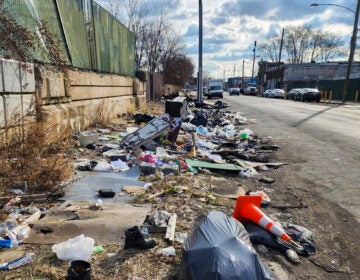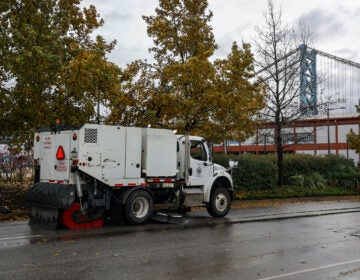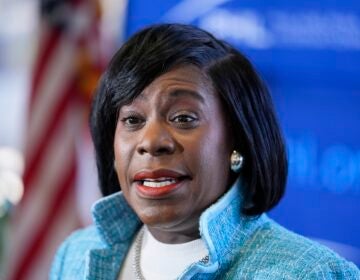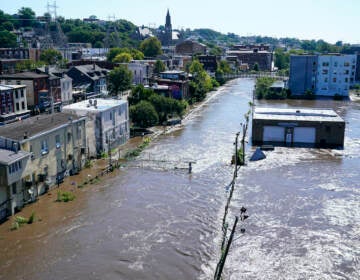‘The sooner, the better’: City Council members want answers on Philly’s progress toward carbon neutrality
Councilmembers Isaiah Thomas and Rue Landau plan to evaluate whether the city is on track to meet its 2050 goal, and how to get there faster.
Listen 1:14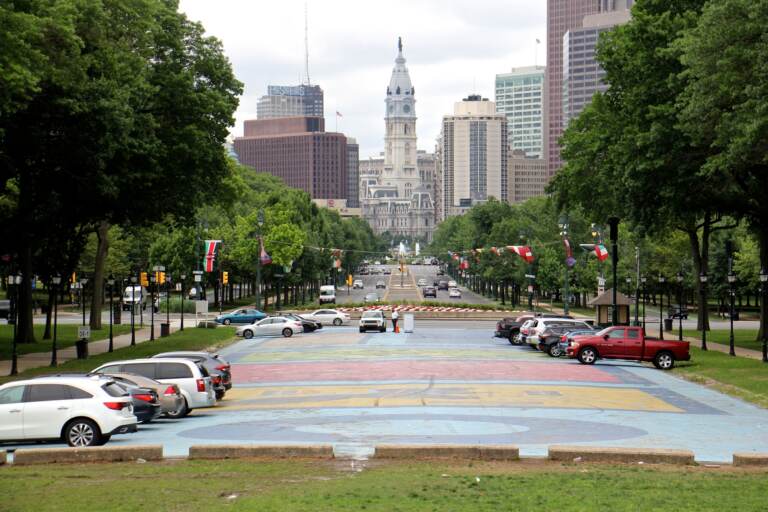
File photo: Looking east toward City Hall from Eakins Oval. (Emma Lee/WHYY)
This story is part of the WHYY News Climate Desk, bringing you news and solutions for our changing region.
From the Poconos to the Jersey Shore to the mouth of the Delaware Bay, what do you want to know about climate change? What would you like us to cover? Get in touch.
Three years ago, the city of Philadelphia committed to zeroing out its emissions of planet-warming greenhouse gasses by 2050.
As the new mayor and City Council lay out their priorities, some members of Council want to speed up the city’s climate actions.
“We’ve seen a series of different things happen as it relates to our weather here in the city of Philadelphia — going from snow to 60 degrees, looking at some of the flooding issues,” At-large City Councilmember and Majority Whip Isaiah Thomas said in an interview Wednesday. “The goal is to assess what the city has said we would do and to look at if we’re making progress.”
Thomas, along with At-large Councilmember Rue Landau, plans to introduce a resolution Thursday that would authorize the Legislative Oversight Committee he chairs to hold a hearing on the city’s progress toward its 2050 carbon neutrality goal and new ways to accelerate cuts to its greenhouse gas emissions.
The hearing will focus on how the city can facilitate a “just energy transition” and center the communities that bear the brunt of pollution, including in the form of flooding, higher asthma rates, and hotter neighborhoods, according to a version shared with WHYY News.
“Climate change is no longer a looming threat. It’s a present one,” said Landau, who is vice chair of the Legislative Oversight Committee. “In order to meaningfully protect our neighbors — the whole city — from climate change and ensure a just response, we need to make major progress in evaluating carbon neutrality in Philadelphia and how we can get there.”
The city’s latest inventory showed Philly met its first interim emissions reduction goal in 2020, but that emissions reductions will need to accelerate.
Overall greenhouse gas emissions in Philly dropped 20% between 2006 and 2019, the inventory found. The improvement was mostly due to a cleaner regional electric grid, as cheaper natural gas replaced coal as the leading power source. City officials also credited energy efficiency improvements in buildings.
But emissions from two key sources — the transportation sector and natural gas used in buildings and industry — had gone up.
Christine Knapp, then-director of the city’s Office of Sustainability, told WHYY in 2022 that she considered the city on track to meet its 2050 goal.
“We’re a fifth of the way there, but we have less than 30 years to get there,” Knapp said. “We’re going to have to go faster and do more.”
Mayor Cherelle Parker, who took office early this month, has pledged to make Philly the “cleanest, greenest big city in the nation.” In her 100-day plan, she promised to help meet the city’s carbon neutrality goal by increasing public transit use and planting trees.
As a candidate, Parker vowed to work with district council members to increase tree canopy in “traditionally underserved neighborhoods,” while advancing development priorities. She also promised to reduce diesel emissions by enforcing anti-idling laws and work with the Philadelphia Gas Commission to make sure the city stays on track to carbon neutrality, while keeping energy prices affordable. The mayor appoints two members of the Gas Commission, which approves the budget of the city-owned gas utility, PGW.
The mounting effects of climate change mean the city should consider ways to reach carbon neutrality before 2050, Thomas’ draft resolution states.
“The goal is to get to carbon neutrality sooner,” Landau said. “If we don’t get everybody to the table in this way so we can collect the data and the information to see where we need to go, we’re not going to be able to hit our goal.”
Globally, 2023 was the warmest year on record — due to human-caused climate change and the effects of El Niño.
The world is set to pass the 1.5 degrees Celsius of warming that countries have agreed to limit change to this century. Even beyond the 1.5 degree threshold, every increment of warming will intensify the dangers, scientists have found — so every bit of warming avoided is important.
“The sooner we can get there, the better,” Thomas said.
The Legislative Oversight Committee hearing would ideally feature testimony from Parker’s administration, community groups, advocates, academics, utility companies, and urbanists, Landau and staff in Thomas’ office said.
The hearing could inform budget negotiations this spring, said Thomas’ spokesperson Ben Wilcox.

Get daily updates from WHYY News!
WHYY is your source for fact-based, in-depth journalism and information. As a nonprofit organization, we rely on financial support from readers like you. Please give today.




